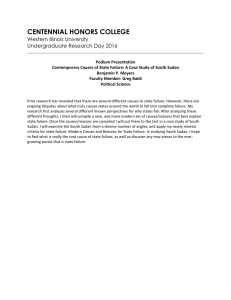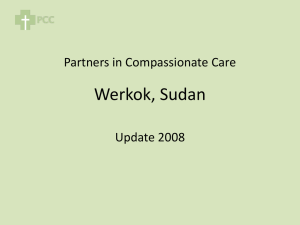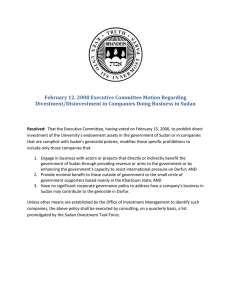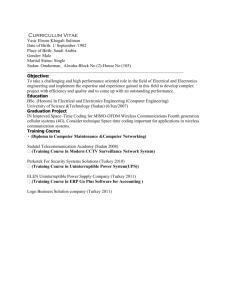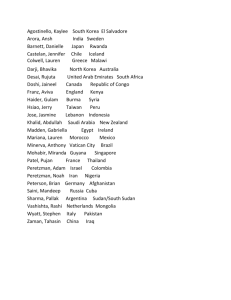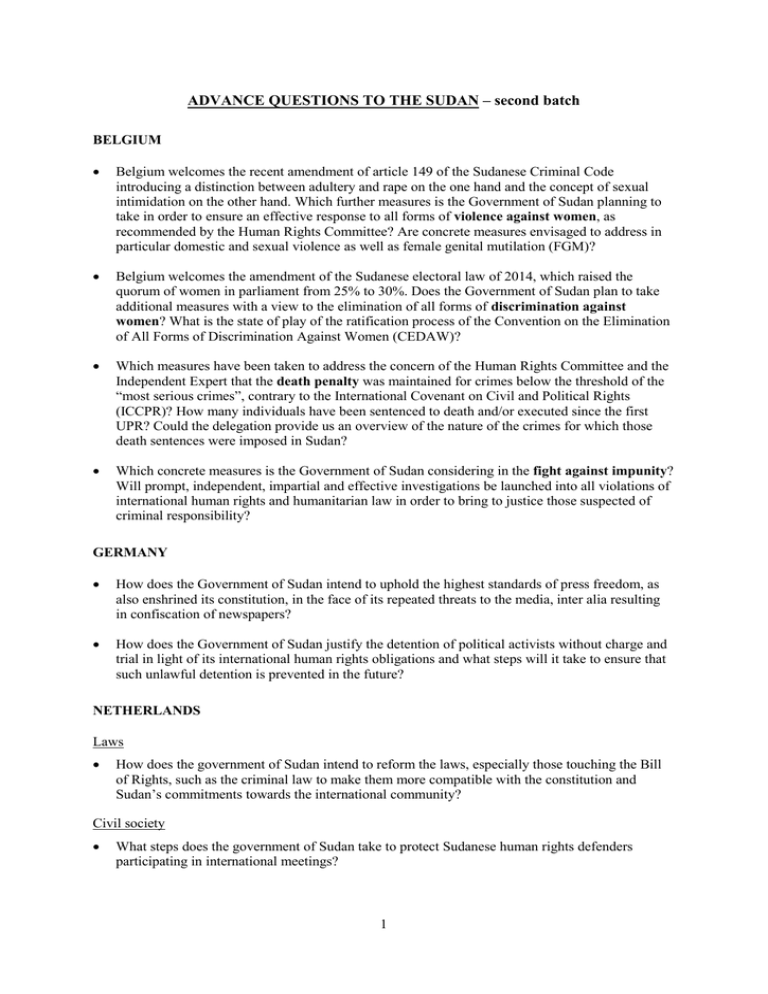
ADVANCE QUESTIONS TO THE SUDAN – second batch
BELGIUM
Belgium welcomes the recent amendment of article 149 of the Sudanese Criminal Code
introducing a distinction between adultery and rape on the one hand and the concept of sexual
intimidation on the other hand. Which further measures is the Government of Sudan planning to
take in order to ensure an effective response to all forms of violence against women, as
recommended by the Human Rights Committee? Are concrete measures envisaged to address in
particular domestic and sexual violence as well as female genital mutilation (FGM)?
Belgium welcomes the amendment of the Sudanese electoral law of 2014, which raised the
quorum of women in parliament from 25% to 30%. Does the Government of Sudan plan to take
additional measures with a view to the elimination of all forms of discrimination against
women? What is the state of play of the ratification process of the Convention on the Elimination
of All Forms of Discrimination Against Women (CEDAW)?
Which measures have been taken to address the concern of the Human Rights Committee and the
Independent Expert that the death penalty was maintained for crimes below the threshold of the
“most serious crimes”, contrary to the International Covenant on Civil and Political Rights
(ICCPR)? How many individuals have been sentenced to death and/or executed since the first
UPR? Could the delegation provide us an overview of the nature of the crimes for which those
death sentences were imposed in Sudan?
Which concrete measures is the Government of Sudan considering in the fight against impunity?
Will prompt, independent, impartial and effective investigations be launched into all violations of
international human rights and humanitarian law in order to bring to justice those suspected of
criminal responsibility?
GERMANY
How does the Government of Sudan intend to uphold the highest standards of press freedom, as
also enshrined its constitution, in the face of its repeated threats to the media, inter alia resulting
in confiscation of newspapers?
How does the Government of Sudan justify the detention of political activists without charge and
trial in light of its international human rights obligations and what steps will it take to ensure that
such unlawful detention is prevented in the future?
NETHERLANDS
Laws
How does the government of Sudan intend to reform the laws, especially those touching the Bill
of Rights, such as the criminal law to make them more compatible with the constitution and
Sudan’s commitments towards the international community?
Civil society
What steps does the government of Sudan take to protect Sudanese human rights defenders
participating in international meetings?
1
Which steps will the government of Sudan take to investigate and bring to justice those
responsible for arbitrary arrests, unlawful detention, enforced disappearances and torture?
What measures will the government of Sudan take to protect human rights defenders from
violence and address impunity for crimes against human rights defenders, including defenders of
women’s human rights?
Women’s human rights
How is the government of Sudan working to realize its 2011 commitment to ratify the UN
Convention on the Elimination of All forms of Discrimination against Women (CEDAW), and
ensure its implementation?
Freedom of expression
Does the government of Sudan intend to inform UNESCO of the actions taken to prevent the
impunity of the perpetrators of the killing of journalists and notify UNESCO of the status of the
judicial inquiry conducted?
Freedom of Religious Belief
Which steps does the Government take to guarantee de facto and de jure freedom of religion and
belief?
Humanitarian access
Which steps will the government of Sudan take to provide unrestricted access to conflict area’s
such as Darfur, South-Kordofan and Blue Nile?
NORWAY
What is currently being done to align national law with international human rights treaties to
which Sudan is a state party? Are there steps taken to revise national laws like the Personal Status
Law, the Sudanese Criminal Act of 1991 and the Penal Code?
What is being done to raise awareness of human rights treaties ratified by Sudan and to ensure
their application by the armed forces, the police, the National Intelligence and Security Services
and the Rapid Response Force?
What has been done to safeguard independence and ensure sufficient resources to the established
National Human Rights Commission? How can the international community best support this
process?
In 2011, Sudan accepted to ratify the UN Convention on the elimination of all forms of
discrimination against women (CEDAW). What has been done to comply with this accepted
recommendation?
What concrete steps will the Sudanese Government take to ensure freedom of press?
How is the government ensuring that allegations of unlawful killings, enforced disappearances,
torture, mass-rape and other human rights violations are independently investigated?
We commend the government on their work towards the abolishment of child marriages. What is
being done to ensure that law and practices are aligned with international treaties?
2
MEXICO
What measures have been taken to improve the reporting of cases of sexual and gender-based
violence offences against women?
Are there any efforts to appropriately investigate sexual violence offences and secure access to
justice for the victims?
What efforts have been taken to increase the registration of children in order to obtain official
birth certificates?
SPAIN
In what stage are the investigations opened after the death of nearly 200 people in the riots
that took place in September 2013?
What measures will the Sudanese Government adopt in order to allow the several millions of
IDPs that, according to United Nations, are in the country; to return to their hometowns?
What measures does the Sudanese Government envisage to effectively combat impunity?
3

